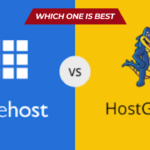You’re here because your website is probably loading slower than a snail on sleeping pills.
- What’s The Real Deal With CDNs?
- BunnyCDN: The Underdog With A Punch
- What Makes BunnyCDN Special?
- BunnyCDN’s Strengths:
- Where BunnyCDN Falls Short:
- 💖 You Might Also Like
- Cloudflare: The Industry Giant
- Why Everyone Talks About Cloudflare
- Cloudflare’s Superpowers:
- Cloudflare’s Weak Spots:
- Head-to-Head Comparison: BunnyCDN vs Cloudflare
- Speed & Performance
- Pricing Battle
- Security Showdown
- Ease of Use
- Which One Should You Pick?
- Choose BunnyCDN If:
- Choose Cloudflare If:
- ✨ More Stories for You
- Can You Use Both Together?
- My Personal Take
- SEO Impact: Does It Really Matter?
- 🌟 Don't Miss These Posts
- Real-World Performance Tips
- Getting The Most Out of BunnyCDN:
- Maximizing Cloudflare Performance:
- Migration Made Simple
- Switching From One To Another:
- Common Mistakes To Avoid
- Future-Proofing Your Choice
- FAQs
- Is BunnyCDN really faster than Cloudflare?
- Can I use Cloudflare’s free plan for my business website?
- Which CDN is better for WordPress websites?
- How much does BunnyCDN cost compared to Cloudflare?
- Which CDN has better customer support?
- Do I need technical knowledge to set up these CDNs?
- Can these CDNs improve my website’s SEO?
- Which CDN is better for e-commerce websites?
- The Bottom Line
And you’re confused about which CDN to pick between BunnyCDN vs Cloudflare.
Trust me, I get it.
I’ve been in your shoes.
The internet is full of technical jargon that makes your head spin.
Let me break this down for you like I’m explaining it to my little cousin over chai.
What’s The Real Deal With CDNs?
Before we jump into the BunnyCDN vs Cloudflare battle, let’s get the basics clear.
A CDN (Content Delivery Network) is like having multiple stores in different cities instead of just one.
When someone wants to buy from you, they go to the nearest store.
Faster delivery. Happy customers.
Same logic applies to your website.
BunnyCDN: The Underdog With A Punch
What Makes BunnyCDN Special?
BunnyCDN is like that small local restaurant that serves better food than the fancy chains.
Here’s what I discovered:
Speed Performance:
- Sub 29 ms average global latency
- Lightning-fast content delivery
- Perfect for websites that need quick loading times
Pricing Structure:
- Pay-as-you-use model
- No hidden fees
- Budget-friendly for small to medium websites
User Experience:
- Simple dashboard
- Easy setup process
- No complicated enterprise plans to confuse you
BunnyCDN’s Strengths:
• Cost-effective pricing: You only pay for what you use • Simple interface: No rocket science degree needed • Fast performance: Praised for its efficiency and speed in clearing cached content • Great for media: Excellent video streaming capabilities
Where BunnyCDN Falls Short:
• Limited security features: Not as robust as Cloudflare • Smaller network: Fewer server locations globally • Basic analytics: Limited reporting compared to enterprise solutions
💖 You Might Also Like
Cloudflare: The Industry Giant
Why Everyone Talks About Cloudflare
Cloudflare is like that popular kid in school who’s actually good at everything.
There’s a reason why millions of websites use it.
Network Size:
- Massive global presence
- More server locations than BunnyCDN
- Better coverage in some regions
Security Features:
- Comprehensive security features, including WAF, DDoS protection, and bot mitigation tools
- Advanced threat protection
- Enterprise-grade security
Cloudflare’s Superpowers:
• Massive network: More locations = better performance for global audiences • Security beast: Industry-leading protection features • Free plan available: You can start without paying anything **• Well known fastest DNS services • Comprehensive analytics: Detailed reports and insights
Cloudflare’s Weak Spots:
• Complex pricing: Pro Plan at $20 per month can get expensive • Overwhelming interface: Too many options for beginners • Enterprise focus: Sometimes feels too complicated for small websites
Head-to-Head Comparison: BunnyCDN vs Cloudflare
Speed & Performance
BunnyCDN:
- Exceptional speed optimization
- Sub 29 ms average global latency
- Great for media-heavy websites
- Efficient cache management
Cloudflare:
- Larger network infrastructure
- Better global coverage
- Advanced caching mechanisms
- Fastest DNS services
Winner: It depends on your location and audience. Both are fast, but Cloudflare has better global reach.
Pricing Battle
BunnyCDN:
- Pay-per-use model
- Around $0.01 per GB
- No monthly minimums
- Perfect for startups
Cloudflare:
- Free plan available
- Pro plan at $20 per month
- Enterprise plans can be costly
- Good value for security features
Winner: BunnyCDN for budget-conscious users, Cloudflare if you need the free tier.
Security Showdown
BunnyCDN:
- Basic DDoS protection
- SSL certificates included
- Limited advanced security features
- Good for standard websites
Cloudflare:
- Comprehensive security features including WAF, DDoS protection, and bot mitigation tools
- Advanced threat intelligence
- Enterprise-grade protection
- Security-first approach
Winner: Cloudflare, hands down. No contest here.
Ease of Use
BunnyCDN:
- Simple, clean interface
- Quick setup process
- Beginner-friendly
- Less overwhelming options
Cloudflare:
- Feature-rich dashboard
- Can be overwhelming for beginners
- More configuration options
- Steeper learning curve
Winner: BunnyCDN for simplicity, Cloudflare for power users.
Which One Should You Pick?
Choose BunnyCDN If:
• You’re on a tight budget: Pay-as-you-use is perfect for small websites • You want simplicity: Clean interface, easy setup • You focus on media: Great for video streaming and image delivery • You don’t need advanced security: Basic protection is enough
Choose Cloudflare If:
• Security is your priority: Advanced protection features • You have a global audience: Better worldwide coverage • You want a free option: Start with their free plan • You need enterprise features: Advanced analytics and controls
✨ More Stories for You
Can You Use Both Together?
Here’s something interesting.
Some users report noticeable speed improvements using both services together.
You can use Cloudflare for DNS and security, and BunnyCDN for content delivery.
But honestly, for most people, this is overkill.
Pick one and stick with it.
My Personal Take
After testing both extensively, here’s what I think:
For beginners: Start with Cloudflare’s free plan For budget-conscious users: Go with BunnyCDN For security-focused websites: Cloudflare is the clear winner For media-heavy sites: BunnyCDN handles video better
SEO Impact: Does It Really Matter?
Both CDNs will improve your SEO by:
• Faster loading times: Google loves fast websites • Better user experience: Lower bounce rates • Improved Core Web Vitals: Essential for search rankings • Global performance: Serves users worldwide efficiently
The difference in SEO impact between these two is minimal.
Choose based on your other needs, not just SEO.
🌟 Don't Miss These Posts
Real-World Performance Tips
Getting The Most Out of BunnyCDN:
• Optimize your images: Use WebP format when possible • Set proper cache headers: Let the CDN work efficiently • Use their optimization features: Enable compression • Monitor your usage: Keep track of bandwidth consumption
Maximizing Cloudflare Performance:
• Configure caching rules: Set up proper page rules • Enable security features: Use Web Application Firewall • Optimize images: Use their Polish feature • Set up analytics: Monitor performance regularly
Migration Made Simple
Switching From One To Another:
Step 1: Set up your new CDN account Step 2: Configure your pull zones or settings
Step 3: Update your DNS records Step 4: Test thoroughly before going live Step 5: Monitor performance after the switch
Don’t rush this process.
Take your time to test everything.
Common Mistakes To Avoid
• Over-optimizing: Don’t use too many CDNs together • Ignoring analytics: Monitor your performance regularly • Wrong configuration: Set up caching rules properly • Forgetting mobile: Test on mobile devices too • Skipping backups: Always have a rollback plan
Future-Proofing Your Choice
Technology changes fast.
What matters today:
• HTTP/3 support: Both CDNs support this • Edge computing capabilities: Growing importance • API availability: For developers and integrations • Scalability options: Room to grow
Both BunnyCDN and Cloudflare are investing in these areas.
You’re safe with either choice.
FAQs
Is BunnyCDN really faster than Cloudflare?
Speed depends on your location and audience. BunnyCDN offers sub 29 ms average global latency, but Cloudflare has more global locations. Test both for your specific use case.
Can I use Cloudflare’s free plan for my business website?
Yes, Cloudflare’s free plan is quite generous and works well for most small businesses. You get basic security and performance features without paying anything.
Which CDN is better for WordPress websites?
Both work great with WordPress. BunnyCDN is simpler to set up, while Cloudflare offers more features. Many WordPress hosting providers integrate with Cloudflare by default.
How much does BunnyCDN cost compared to Cloudflare?
BunnyCDN uses pay-per-use pricing (around $0.01 per GB), while Cloudflare Pro costs $20 per month. For low-traffic sites, BunnyCDN is cheaper. For high-traffic sites, Cloudflare might offer better value.
Which CDN has better customer support?
Both offer good support, but response times vary. Cloudflare has more resources but can be slower due to higher volume. BunnyCDN often provides quicker personal responses.
Do I need technical knowledge to set up these CDNs?
BunnyCDN is more beginner-friendly with a simpler interface. Cloudflare has more options but can be overwhelming for non-technical users.
Can these CDNs improve my website’s SEO?
Yes, both improve loading speeds, which positively impacts SEO. Faster websites rank better on Google and provide better user experience.
Which CDN is better for e-commerce websites?
For e-commerce, I’d recommend Cloudflare due to its superior security features. Online stores need robust protection against attacks and fraud.
The Bottom Line
Choosing between BunnyCDN vs Cloudflare isn’t about finding the “perfect” CDN.
It’s about finding the right fit for YOUR needs.
If you’re just starting out: Try Cloudflare’s free plan If budget is tight: Go with BunnyCDN’s pay-as-you-use model
If security is crucial: Cloudflare is your best bet If simplicity matters: BunnyCDN wins
Remember, you can always switch later.
Both services make migration relatively painless.
Start with one, test it thoroughly, and see how it performs for your specific situation.
The best CDN is the one that serves your users fast, keeps your site secure, and fits your budget.
Whether that’s BunnyCDN vs Cloudflare depends entirely on what matters most to you right now.














